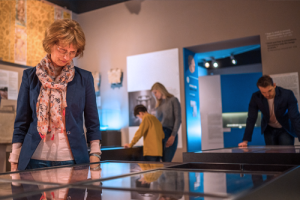What Can You Do With a Master's Degree in Museum Studies?
Published April 29, 2025
 The museums and cultural institutions of today need visionary leaders to engage with 21st-century audiences. They need people who understand modern visitors and the ways in which new technology can keep them engaged. That’s where a Master of Art in Museum Studies degree comes in. This specialized degree helps you hone the skills you need to bridge the gap between educating the public and holding their attention.
The museums and cultural institutions of today need visionary leaders to engage with 21st-century audiences. They need people who understand modern visitors and the ways in which new technology can keep them engaged. That’s where a Master of Art in Museum Studies degree comes in. This specialized degree helps you hone the skills you need to bridge the gap between educating the public and holding their attention.
Let’s look closely at what an MA in Museum Studies means, and how it can help you further your career.
What is a Master’s Degree in Museum Studies?
A master’s program in museum studies focuses on the needs of 21st-century museum professionals. It generally combines theory and practice with advanced digital strategies. The focus may also include new models of innovative education, creative curatorship, immersive exhibitions, and sound business strategies for tomorrow’s museum leaders.
Key Components of Museum Studies Programs
A robust master’s degree program will equip students with the necessary skills and knowledge to pursue a specialization in this dynamic and exciting interdisciplinary field.
- Exhibition Strategies: This component covers strategies and approaches for exhibition planning, development, and implementation to encourage not only enjoyment but critical thinking about exhibitions by focusing on visitor-centered interpretive design applicable to various institutions.
- The Business of Museums: Students must understand the commercial business model of museums and various revenue-generating strategies to ensure their successful operation.
- Foundations of Digital Curation: Students necessarily need to learn about digital curation, metadata schemas, sharing digital content, trustworthy repository services, research data management, policy issues, and user services.
- History & Philosophy of Museums: This allows students to possess in-depth knowledge of museum history and philosophy and their impact on organizational structures.
Who Should Consider a Master’s in Museum Studies?
If you’re passionate about history, art, culture, education, and preservation, a master’s program in museum studies may be a rewarding career pathway.
Career-changers, recent graduates, and museum professionals can advance their current careers with a master’s degree in museum studies.
Career Opportunities with a Master’s in Museum Studies
Holding a Master of Arts in Museum Studies doesn’t limit you to jobs in museums. There are many career paths you can pursue with your degree.
Librarians & Media Collection Specialist
Salary: $64,376, mid-level; $101,982, senior-level
Job Growth: 0.34%
Administer and maintain libraries or collections of information for public or private access.
Fundraisers
Salary: $64,284, mid-level; $107,240, senior-level
Job Growth: 0.56%
Organize fundraising activities, solicit donations, create promotional materials, and raise awareness for the organization.
Curators
Salary: $60,936, mid-level; $117,486, senior-level
Job Growth: 0.53%
Administer collections of museums, and conduct instructional, research, or public service programming.
Archivists
Salary: $58,866, mid-level; $112,,235, senior-level
Job Growth: 0.67%
Evaluate, edit, and safeguard permanent records and historically valuable documents. Conduct research using archival materials.
Set & Exhibit Designers
Salary: $51,038, mid-level; $162,806, senior-level
Job Growth: 0.22%
Design exhibits and sets for film, television, and theater. Includes studying scripts and researching architectural styles.
Data Source: Industry, occupation, compensation, and projected growth data are supplied by Lightcast. Economic and workforce information adjusts based on the selected geographic region and may include estimates made by Lightcast when actual data is not available. Johns Hopkins University cannot guarantee employment placement, salary level, or career advancement.
Benefits of Pursuing a Museum Studies Master’s Degree
Overall, the U.S. Bureau of Labor Statistics projects an 11% growth in the field of museum studies and related occupations through 2033. This means there’s never been a better time to pursue a master’s degree!
Drive the Future of Museums & Institutions
The rapid advancement of information and communication technologies is prompting museums to reconsider their approach and revamp the museum experience to align with the inquisitiveness of multimodal modern learners. There’s an increasing demand for leaders equipped with the expertise and abilities to confront these challenges and develop a forward-looking vision for the museums of tomorrow.
Professional Networking and Internships
During your master’s program, you’ll make valuable connections with peers who share your drive and passion for museum studies. You’ll also have the opportunity to network with instructors and mentors in the field, as well as collaborate on projects with museums and cultural institutions.
Advancing Career in Museum Studies
For working professionals, a master’s degree can significantly elevate your career and earn you more money. Upon completion of your program, you’ll have a competitive edge for job opportunities in the museum sector.
Earn Your Master’s in Museum Studies with JHU AAP
Johns Hopkins University Advanced Academic Programs offer working professionals the opportunity to earn their master’s degrees around their busy schedules. The program can be completed 100% online, giving you the freedom to earn your MA in Museum Studies degree on your own terms.
Learn more about JHU AAP’s programs for working professionals and how to apply today!